- Home
- Alfred Bester
Adam And No Eve
Adam And No Eve Read online
Adam And No Eve
Alfred Bester
Adam and no Eve
by Alfred Bester
Crane knew this must be the seacoast. Instinct told him; but more than instinct. the few shreds of knowledge that clung to his torn, feverish brain told him; the stars that had shown at night through the rare breaks in the clouds, and his compass that still pointed a trembling finger north. That was strangest of all, Crane thought. Though a welter of chaos, the Earth still retained its polarity.
It was no longer a coast; there was no longer any sea. Only the faint line of what had been a cliff, stretching north and south for endless miles. A line of gray ash. The same gray ash and cinders that lay behind him; the same gray ash that stretched before him. Fine silt, knee-deep, that swirled up at every motion and choked him. Cinders that scudded in dense mighty clouds when the mad winds blew. Cinders that were churned to viscous mud when the frequent rains fell.
The sky was jet overhead. The black clouds rode high and were pierced with shafts of sunlight that marched swiftly over the Earth. Where the light struck a cinder storm, it was filled with gusts of dancing, gleaming particles. Where it played through rain it brought the arches of rainbows into being. Rain fell; cinder storms blew; light thrust down—together, alternately and continually in a jigsaw of black and white violence. So it had been for months. So it was over every mile of the broad Earth.
Crane passed the edge of the ashen cliffs and began crawling down the even slope that had once been the ocean bed. He had been traveling so long that all sense of pain had left him. He braced elbows and dragged his body forward. Then he brought his right knee under him and reached forward with elbows again. Elbows, knee, elbows, knee— He had forgotten what it was to walk.
Life, he thought dazedly, is wonderful. It adapts itself to anything. If it must crawl, it crawls. Callus forms on the elbows and knees. The neck and shoulders toughen. The nostrils learn to snort away the ashes before they inhale. The bad leg swells and festers. It numbs, and presently it will rot and fall off.
“I beg pardon,” Crane said, “I didn’t quite get that—”
He peered up at the tall figure before him and tried to understand the words. It was Hallmyer. He wore his stained lab jacket and his gray hair was awry. Hallmyer stood delicately on top of the ashes and Crane wondered why he could see the scudding cinder clouds through his body.
“How do you like your world, Stephen?” Hallmyer asked. Crane shook his head miserably.
“Not very pretty, eh?” said Hallmyer. “Look around you. Dust, that’s all; dust and ashes. Crawl, Stephen, crawl. You’ll find nothing but dust and ashes—”
Hallmyer produced a goblet of water from nowhere. It was clear and cold. Crane could see the fine mist of dew on its surface and his mouth was suddenly coated with dry grit.
“Hallmyer!” he cried. He tried to get to his feet and reach for the water, but the jolt of pain in his right leg warned him. He crouched back.
Hallmyer sipped and then spat in his face. The water felt warm.
“Keep crawling,” said Hallmyer bitterly. “Crawl round and round the face of the Earth. You’ll find nothing but dust and ashes—” He emptied the goblet on the ground before Crane. “Keep crawling. How many miles? Figure it out for yourself. Pi-R-Square. The radius is eight thousand or so—”
He was gone, jacket and goblet. Crane realized that rain was falling again. He pressed his face into the warm sodden cinder mud, opened his mouth and tried to suck the moisture. He groaned and presently began crawling.
There was an instinct that drove him on. He had to get somewhere. It was associated, he knew, with the sea—with the edge of the sea. At the shore of the sea something waited for him. Something that would help him understand all this. He had to get to the sea—that is, if there was a sea any more.
The thundering rain beat his back like heavy planks. Crane paused and yanked the knapsack around to his side where he probed in it with one hand. It contained exactly three things. A pistol, a bar of chocolate and a can of peaches. All that was left of two months’ supplies. The chocolate was pulpy and spoiled. Crane knew he had best eat it before all value rotted away. But in another day he would lack the strength to open the can. He pulled it out and attacked it with the opener. By the time he had pierced and pried away a flap of tin, the rain had passed.
As he munched the fruit and sipped the juice, he watched the wall of rain marching before him down the slope of the ocean bed. Torrents of water were gushing through the mud. Small channels had already been cut—channels that would be new rivers some day. A day he would never see. A day that no living thing would ever see. As he flipped the empty can aside, Crane thought: The last living thing on Earth eats its last meal. Metabolism plays its last act.
Wind would follow the rain. In the endless weeks that he had been crawling, he had learned that. Wind would come in a few minutes and flog him with its clouds of cinders and ashes. He crawled forward, bleary eyes searching the flat gray miles for cover.
Evelyn tapped his shoulder.
Crane knew it was she before he turned his head. She stood alongside, fresh and gay in her bright dress, but her lovely face was puckered with alarm.
“Stephen,” she cried, “you’ve got to hurry!”
He could only admire the way her smooth honey hair waved to her shoulders.
“Oh, darling!” she said, “you’ve been hurt!” Her quick gentle hands touched his legs and back. Crane nodded.
“Got it landing,” he said. “I wasn’t used to a parachute. I always thought you came down gently—like plumping onto a bed. But the gray earth came up at me like a fist—And Umber was fighting around in my arms. I couldn’t let him drop, could I?”
“Of course not, dear—” Evelyn said.
“So I just held on to him and tried to get my legs under me,” Crane said. “And then something smashed my legs and side—”
He paused, wondering how much she knew of what really had happened. He didn’t want to frighten her.
“Evelyn, darling—” he said, trying to reach up his arms. “No dear,” she said. She looked back in fright. “You’ve got to hurry. You’ve got to watch out behind!”
“The cinder storms?” He grimaced. “I’ve been through them before.”
“Not the storms!” Evelyn cried. “Something else. Oh, Stephen—”
Then she was gone, but Crane knew she had spoken the truth. There was something behind—something that had been following him all those weeks. Far in the back of his mind he had sensed the menace. It was closing in on him like a shroud. He shook his head. Somehow that was impossible. He was the last living thing on Earth. How could there be a menace?
The wind roared behind him, and an instant later came the heavy clouds of cinders and ashes. They lashed over him, biting his skin. With dimming eyes, he saw the way they coated the mud and covered it with a fine dry carpet. Crane drew his knees under him and covered his head with his arms. With the knapsack as a pillow, he prepared to wait out the storm. It would pass as quickly as the rain.
The storm whipped up a great bewilderment in his sick head. Like a child he pushed at the pieces of his memory, trying to fit them together. Why was Hallmyer so bitter toward him? It couldn’t have been that argument, could it?
What argument?
Why, that one before all this happened.
Oh, that!
Abruptly, the pieces fit themselves together.
Crane stood alongside the sleek lines of his ship and admired it tremendously. The roof of the shed had been removed and the nose of the ship hoisted so that it rested on a cradle pointed toward the sky. A workman was carefully burnishing the inner surfaces of the rocket jets.
The muffled sounds of an argument
came from within the ship and then a heavy clanking. Crane ran up the short iron ladder to the port and thrust his head inside. A few feet beneath him, two men were buckling the long tanks of ferrous solution into place.
“Easy there,” Crane called. “Want to knock the ship apart?”
One looked up and grinned. Crane knew what he was thinking. That the ship would tear itself apart. Everyone said that. Everyone except Evelyn. She had faith in him. Hallmyer never said it either. But Hallmyer thought he was crazy in another way. As he descended the ladder, Crane saw Hallmyer come into the shed, lab jacket flying.
“Speak of the devil!” Crane muttered.
Hallmyer began shouting as soon as he saw Crane. “Now listen—”
“Not all over again,” Crane said.
Hallmyer dug a sheaf of papers out of his pocket and waved it under Crane’s nose.
“I’ve been up half the night,” he said, “working it through again. I tell you I’m right. I’m absolutely right—”
Crane looked at the tight-written equations and then at Hallmyer’s bloodshot eyes. The man was half mad with fear.
“For the last time,” Hallmyer went on. “You’re using your new catalyst on iron solution. All right. I grant that it’s a miraculous discovery. I give you credit for that.”
Miraculous was hardly the word for it. Crane knew that without conceit, for he realized he’d only stumbled on it. You had to stumble on a catalyst that would induce atomic disintegration of iron and give 10 X 1010 foot-pounds of energy for every gram of fuel. No man was smart enough to think all that up by himself.
“You don’t think I’ll make it?” Crane asked.
“To the moon? Around the moon? Maybe. You’ve got a fifty-fifty chance.” Hallmyer ran fingers through his lank hair. “But for God’s sake, Stephen, I’m not worried about you. If you want to kill yourself, that’s your own affair. It’s the Earth I’m worried about—”
“Nonsense. Go home and sleep it off.”
“Look"—Hallmyer pointed to the sheets of paper with a shaky hand—"no matter how you work the feed and mixing system you can’t get one hundred percent efficiency in the mixing and discharge.”
“That’s what makes it a fifty-fifty chance,” Crane said. “So what’s bothering you?”
“The catalyst that will escape through the rocket tubes. Do you realize what it’ll do if a drop hits the Earth? It’ll start a chain of iron disintegrations that’ll envelope the globe. It’ll reach out to every iron atom—and there’s iron everywhere. There won’t be any Earth left for you to return to—”
“Listen,” Crane said wearily, “we’ve been through all this before.”
He took Hallmyer to the base of-the rocket cradle. Beneath the iron framework was a two-hundred-foot pit, fifty feet wide and lined with firebrick.
“That’s for the initial discharge flames. If any of the catalyst goes through, it’ll be trapped in this pit and taken care of by the secondary reactions. Satisfied now?”
“But while you’re in flight,” Hallmyer persisted, “you’ll be endangering the Earth until you’re beyond Roche’s limit. Every drop of non-activated catalyst will eventually sink back to the ground and—”
“For the very last time,” Crane said grimly, “the flame of the rocket discharge takes care of that. It will envelop any escaped particles and destroy them. Now get out. I’ve got work to do.”
As he pushed him to the door, Hallmyer screamed and waved his arms. “I won’t let you do it!” he repeated over and over. “I’ll find some way to stop you. I won’t let you do it—”
Work? No, it was sheer intoxication to labor over the ship. It had the fine beauty of a well-made thing. The beauty of polished armor, of a balanced swept-hilt rapier, of a pair of matched guns. There was no thought of danger and death in Crane’s mind as he wiped his hands with waste after the last touches were finished.
She lay in the cradle ready to pierce the skies. Fifty feet of slender steel, the rivet heads gleaming like jewels. Thirty feet were given over to fuel the catalyst. Most of the forward compartment contained the spring hammock Crane had devised to take up the initial acceleration shock. The ship’s nose was a solid mass of natural quartz that stared upward like a cyclopian eye.
Crane thought: She’ll die after this trip. She’ll return to the Earth and smash in a blaze of fire and thunder, for there’s no way yet of devising a safe landing for a rocket ship. But it’s worth it. She’ll have had her one great flight, and that’s all any of us should want. One great beautiful flight into the unknown--
As he locked the workshop door, Crane heard Hallmyer shouting from the cottage across the fields. Through the evening gloom he could see him waving frantically. He trotted through the crisp stubble, breathing the sharp air deeply, grateful to be alive.
“It’s Evelyn on the phone,” Hallmyer said.
Crane stared at him. Hallmyer was acting peculiarly. He refused to meet his eyes.
“What’s the idea?” Crane asked. “I thought we agreed that she wasn’t to call—wasn’t to get in touch with me until I was ready to start? You been putting ideas into her head? Is this the way you’re going to stop me?”
Hallmyer said, “No—” and studiously examined the indigo horizon.
Crane went into his study and picked up the phone.
“Now, listen, darling,” he said without preamble, “there’s no sense getting alarmed now. I explained everything very carefully. Just before the ship crashes, I take to a parachute and float down as happy and gentle as Wynken, Blynken and Mod. I love you very much and I’ll see you Wednesday when I start. So long—”
“Good-bye, sweetheart,” Evelyn’s clear voice said, “and is that what you called me for?”
“Called you!”
A brown hulk disengaged itself from the hearth rug and lifted itself to strong legs. Umber, Crane’s Great Dane, sniffed and cocked an ear. Then he whined.
“Did you say I called you?” Crane shouted.
Umber’s throat suddenly poured forth a bellow. He reached Crane in a single bound, looked up into his face and whined and roared all at once.
“Shut up, you monster!” Crane said. He pushed Umber away with his foot.
“Give Umber a kick for me,” Evelyn laughed. “Yes, dear. Someone called and said you wanted to speak to me.” “They did, eh? Look, honey, I’ll call you back—”
Crane hung up. He arose doubtfully and watched Umber’s uneasy actions. Through the windows, the late evening glow sent flickering shadows of orange light. Umber gazed at the light, sniffed and bellowed again: Suddenly struck, Crane leaped to the window.
Across the fields a solid mass of flame thrust high into the air, and within it was the fast-crumbling walls of the workshop. Silhouetted against the blaze, the figure of half a dozen men darted and ran.
“Good heavens!” Crane cried.
He shot out of the cottage and with Umber hard at his heels, sprinted toward the shed. As he ran he could see the graceful nose of the spaceship within the core of heat, still looking cool and untouched. If only he could reach it before the flames softened its metal and started the rivets.
The workmen trotted up to him, grimy and panting. Crane gaped at them in a mixture of fury and bewilderment. “Hallmyer!” he shouted. “Hallmyer!”
Hallmyer pushed through the crowd. His eyes were wild and gleamed with triumph.
“Too bad,” he said. “I’m sorry, Stephen—”
“You swine!” Crane shouted. “You frightened old man!” He grasped Hallmyer by the lapels and shook him just once. Then he dropped him and started into the shed.
Hallmyer cried something and an instant later a body hurtled against Crane’s calves and spilled him to the ground. He lurched to his feet, fists swinging. Umber was alongside, growling over the roar of the flames. Crane smashed a man in the face, and saw him stagger back against a second. He lifted a knee in a vicious drive that sent the last man crumpling to the ground. Then he ducked his head and plunge
d into the shop.
The scorch felt cool at first, but when he reached the ladder and began mounting to the port, he screamed with the agony of his bums. Umber was howling at the foot of the ladder, and Crane realized that the dog could never escape from the rocket blasts. He reached down and hauled Umber into the ship.
Crane was reeling as he closed and locked the port. He retained consciousness barely long enough to settle himself in the spring hammock. Then instinct alone prompted his hands to reach out toward the control board. Instinct and the frenzied refusal to let his beautiful ship waste itself in the flames. He would fail— Yes. But he would fail, trying.
His fingers tripped the switches. The ship shuddered and roared. And blackness descended over him.
How long was he unconscious? There was no telling. Crane awoke with cold pressing against his face and body, and the sound of frightened yelps in his ears. Crane looked up and saw Umber tangled in the springs and straps of the ham-mock. His first impulse was to laugh; then suddenly he realized. He had looked up! He had looked up at the hammock.
He was lying curled in the cup of the quartz nose. The ship had risen high—perhaps almost to Roche’s zone, to the limit of the Earth’s gravitational attraction, but then without guiding hands at the controls to continue its flight, had turned and was dropping back toward Earth. Crane peered through the crystal and gasped.
Below him was the ball of the Earth. It looked three times the size of the moon. And it was no longer his Earth. It was a globe of fire mottled with black clouds. At the northernmost pole there was a tiny patch of white, and even as Crane watched, it was suddenly blotted over with hazy tones of red, scarlet and crimson. Hallmyer had been right.
He lay frozen in the cup of the nose for hours as the ship descended, watching the flames gradually fade away to leave nothing but the dense blanket of black around the Earth. He lay numb with horror, unable to understand—unable to reckon up a billion people snuffed out, a green fair planet reduced to ashes and cinders. His family, home, friends, everything that was once dear and close to him—gone. He could not think of Evelyn.

 Galatea Galante
Galatea Galante Hobson’s Choice
Hobson’s Choice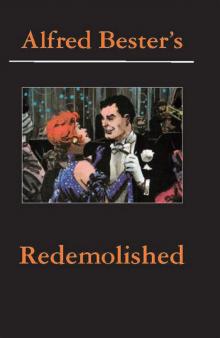 Redemolished
Redemolished The Flowered Thundermug
The Flowered Thundermug The Starcomber
The Starcomber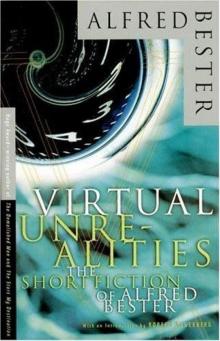 Virtual Unrealities: The Short Fiction of Alfred Bester
Virtual Unrealities: The Short Fiction of Alfred Bester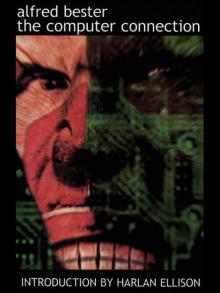 The Computer Connection
The Computer Connection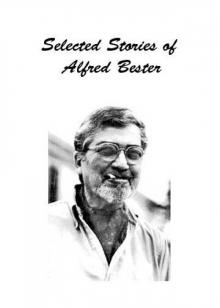 Selected Stories of Alfred Bester
Selected Stories of Alfred Bester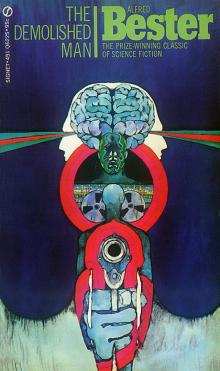 The Demolished Man
The Demolished Man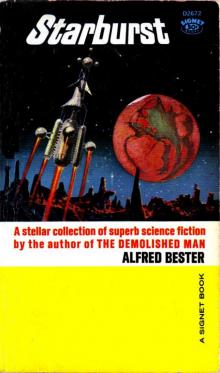 Starburst
Starburst Psychoshop
Psychoshop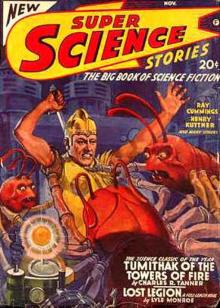 Biped Reegan
Biped Reegan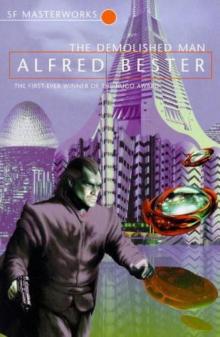 Demolished Man
Demolished Man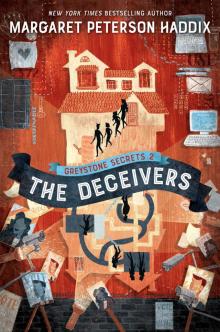 THE DECEIVERS
THE DECEIVERS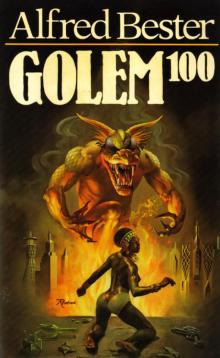 GOLEM 100
GOLEM 100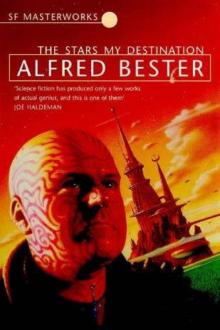 The Stars My Destination
The Stars My Destination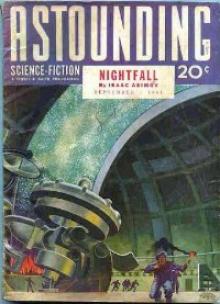 Adam And No Eve
Adam And No Eve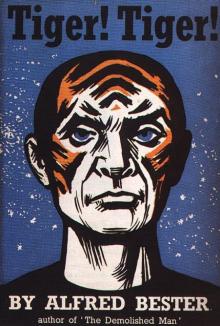 The Stars My Destination ( Tiger! Tiger! )
The Stars My Destination ( Tiger! Tiger! )